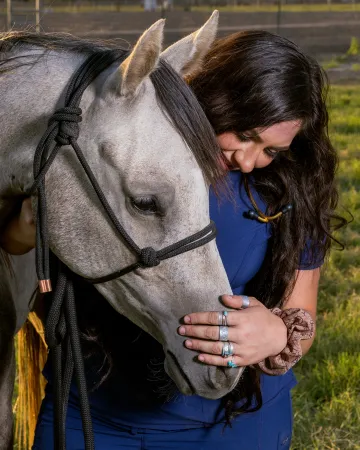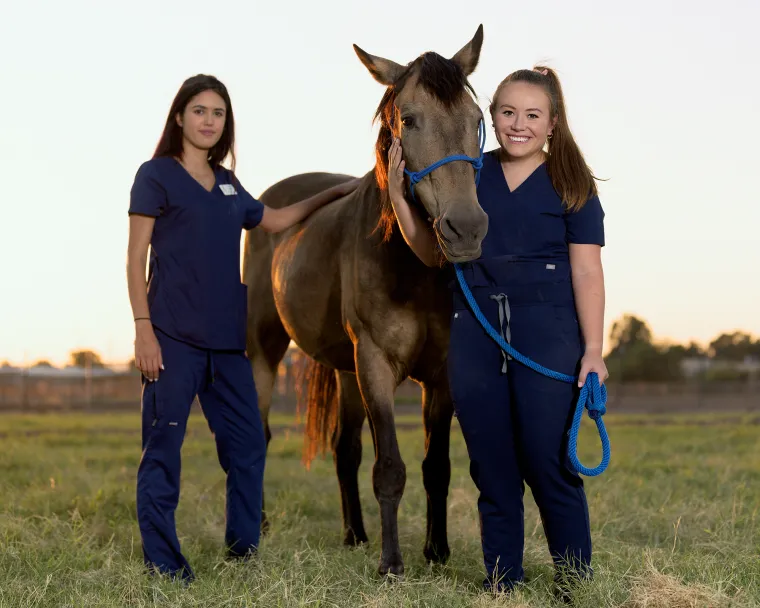Compassionate Care
Veterinary School Heals People and Pets
When the University of Arizona’s new College of Veterinary Medicine welcomed its first class this fall, students were immersed in innovative programming and options for learning both in person and online during the coronavirus pandemic.
Established with a $9 million grant from the Kemper and Ethel Marley Foundation, the state’s only public veterinary medical and surgical program is designed around a “distributive” model: Rather than building its own clinics and hospitals, the college has instructors at satellite facilities.

Hannah Bates
And in their last two semesters, students will gain real-world experience working alongside experienced veterinarians in small-town clinics, government agencies and animal shelters across the state. This collaboration is crucial for underserved rural Arizona, says Dean Julie Funk. “We want to work with communities to make sure we fully understand their needs and to make sure our students have those skill sets.”
Another novel aspect of the program is a year-round schedule that allows students to graduate faster and with reduced student loan debt. Nationwide, graduating veterinary students often face debt topping $300,000; the college hopes to cut that in half.
These innovations are aimed both at helping students and at addressing the state’s chronic veterinarian shortage.
“We believe that people who study in Arizona will stay in Arizona,” Funk says. “That’s a critical part of our mission.” And with less debt on graduation, students may feel less pressure to take higher-paying jobs in urban areas.
Funk is a perfect fit for the college’s big ambitions. Before coming to Arizona in 2019, she served as associate dean for academic programs and student success at Michigan State University’s College of Veterinary Medicine.
While there, she also taught in the department of large animal clinical sciences, led a strategic overhaul of the curriculum, created a clinical skills laboratory and established the college’s first-ever career services adviser position.
With a pioneering dean and fresh educational approach, Arizona’s new college is poised to raise the bar for veterinary science, even amid the extraordinary challenges of a pandemic. In fact, Funk says, without students already in the pipeline, “We were able to focus on planning for what the fall would look like with our inaugural class.”
As in the majority of campus programs, the fall semester at the vet college has included class options that are a hybrid of in-class and online teaching. “We’ve learned from testing our students that the online environment works just as well as in person,” Funk says. “So we feel really comfortable in offering that diploma online with our incoming class.”

Shannon Khodadad and Molly Oishi | Santana Nez

Shannon Khodadad and Molly Oishi | Santana Nez
At the same time, in-person teaching will happen at the Campus Agricultural Center in midtown Tucson, “where we can spread students out enough, wear masks, and do the kinds of things that just don’t translate online, like working directly with animals.”
Of course, staying healthy during a pandemic goes beyond the physical. Mental health is an issue for many, and it’s a topic especially relevant among veterinarians. “Many people don’t realize that the veterinary profession as a whole is in a wellness crisis,” says Funk, who established a student wellness program at Michigan State’s vet school.
“Veterinarians — depending on the study — have three to four times the suicide rate of the general public. The rates are highest among younger female practitioners. This awareness is just coming to our profession. And the profession is responding well, by acknowledging the crisis we are having.”
Part of that recognition involves treating wellness as a professional skill. “It’s actually a part of our curriculum,” says Funk. “Students will be learning strategies to take care of themselves and to recognize when other people are in distress and how they can help support their colleagues.”
The American Veterinary Medical Association says that veterinary professionals are at risk of “compassion fatigue” through their empathetic care for ill and dying animals. “Like other caregivers, we deal with death and illness on a daily basis,” says an article on the association’s website.
And it isn’t only about the animals, the AVMA continues. “We have to deliver bad news to clients, deal with animal cruelty, and see clients struggle to balance financial needs with the needs of their pets.”
Funk stresses that care for the human-animal bond is a critical piece of veterinary care. “Of course we take care of animals, but ultimately we serve people through their animals. It’s about the distress of the people as well.
Our whole goal is to help sustain and strengthen that human-animal bond through healthy animals.”
Whether an animal is a beloved pet or a valued asset in food production, Funk says, “there is a bond there, and the veterinarian is supporting and enriching that bond. It’s really important for students to understand that and be able to have conversations with their clients about that bond. Because ultimately, if they more fully understand the nature of it, they can better serve both the patient and the client.”
As many turn to their pets for comfort during the pandemic, Funk says the college will be leading a campus-wide discussion of the human-animal bond, especially in times of stress. To that end, the veterinary school has established an interdisciplinary research center that will bring together the university’s strengths and resources to further understand and enrich that bond.
“There’s never been an educational program that talks about that,” she notes.
And never a more critical time than right now.
